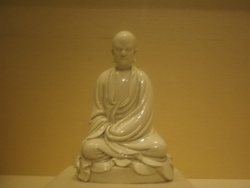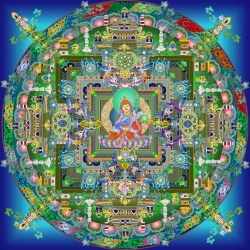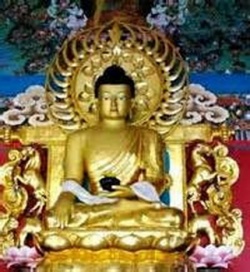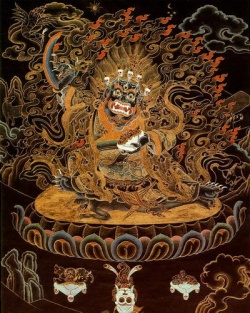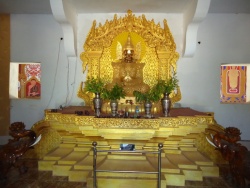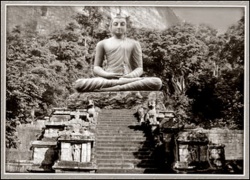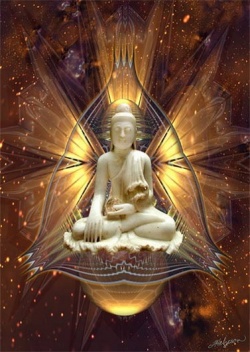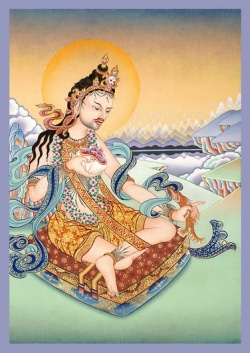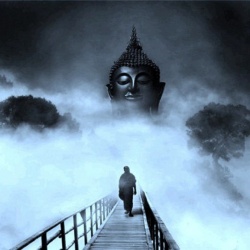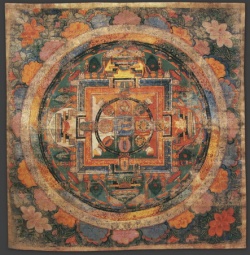Difference between revisions of "The Gospel of Buddha:Chapter 70: Luxurious Living"
(Created page with "{{DisplayImages|1755|342|170|1746|1718|708|1691|1289|486|29}} While the Buddha was preaching his doctrine<br/> for the conversion of the world in the neighbourhood of Savatthi...") |
|||
| Line 1: | Line 1: | ||
{{DisplayImages|1755|342|170|1746|1718|708|1691|1289|486|29}} | {{DisplayImages|1755|342|170|1746|1718|708|1691|1289|486|29}} | ||
| − | While the Buddha was preaching his doctrine<br/> | + | While the [[Buddha]] was preaching his [[doctrine]]<br/> |
| − | for the conversion of the world in the neighbourhood of Savatthi,<br/> | + | for the [[conversion]] of the [[world]] in the neighbourhood of [[Savatthi]],<br/> |
| − | a man of great wealth who suffered from many ailments<br/> | + | a man of great [[wealth]] who [[suffered]] from many {{Wiki|ailments}}<br/> |
came to him with clasped hands and said:<br/> | came to him with clasped hands and said:<br/> | ||
| − | "World-honoured Buddha,<br/> | + | "World-honoured [[Buddha]],<br/> |
| − | pardon me for my want of respect in not saluting thee as I ought,<br/> | + | pardon me for my want of [[respect]] in not saluting thee as I ought,<br/> |
| − | but I suffer greatly from obesity, excessive drowsiness, and other complaints,<br/> | + | but I [[suffer]] greatly from obesity, excessive [[drowsiness]], and other complaints,<br/> |
| − | so that I cannot move without pain." [1]<br/> | + | so that I cannot move without [[pain]]." [1]<br/> |
<br/> | <br/> | ||
| − | The Tathagata, seeing the luxuries with which the man was surrounded asked him:<br/> | + | The [[Tathagata]], [[seeing]] the luxuries with which the man was surrounded asked him:<br/> |
| − | "Hast thou a desire to know the cause of thy ailments?"<br/> | + | "Hast thou a [[desire]] to know the [[cause]] of thy {{Wiki|ailments}}?"<br/> |
| − | And when the wealthy man expressed his willingness to learn, the Blessed One said:<br/> | + | And when the wealthy man expressed his willingness to learn, the [[Blessed One]] said:<br/> |
| − | "There are five things which produce the condition of which thou complainest:<br/> | + | "There are five things which produce the [[condition]] of which thou complainest:<br/> |
| − | opulent dinners, love of sleep, hankering after pleasure,<br/> | + | opulent dinners, [[love]] of [[sleep]], hankering after [[pleasure]],<br/> |
| − | thoughtlessness, and lack of occupation.<br/> | + | thoughtlessness, and lack of {{Wiki|occupation}}.<br/> |
| − | Exercise self-control at thy meals, and take upon thyself<br/> | + | Exercise {{Wiki|self-control}} at thy meals, and take upon thyself<br/> |
| − | some duties that will exercise thy abilities<br/> | + | some duties that will exercise thy {{Wiki|abilities}}<br/> |
and make thee useful to thy fellow-men.<br/> | and make thee useful to thy fellow-men.<br/> | ||
| − | In following this advice thou wilt prolong thy life." [2]<br/> | + | In following this advice thou wilt prolong thy [[life]]." [2]<br/> |
<br/> | <br/> | ||
| − | The rich man remembered the words of the Buddha<br/> | + | The rich man remembered the words of the [[Buddha]]<br/> |
| − | and after some time having recovered his lightness<br/> | + | and after some [[time]] having recovered his lightness<br/> |
| − | and body and youthful buoyancy<br/> | + | and [[body]] and youthful buoyancy<br/> |
| − | returned to the World-honoured One and,<br/> | + | returned to the [[World-honoured One]] and,<br/> |
| − | coming afoot without horses and attendants, said to him:<br/> | + | coming afoot without [[horses]] and attendants, said to him:<br/> |
| − | "Master, thou hast cured my bodily ailments;<br/> | + | "[[Master]], thou hast cured my [[bodily]] {{Wiki|ailments}};<br/> |
| − | I come now to seek enlightenment of my mind." [3]<br/> | + | I come now to seek [[enlightenment]] of my [[mind]]." [3]<br/> |
<br/> | <br/> | ||
| − | And the Blessed One said:<br/> | + | And the [[Blessed One]] said:<br/> |
| − | "The worldling nourishes his body,<br/> | + | "The [[worldling]] nourishes his [[body]],<br/> |
| − | but the wise man nourishes his mind.<br/> | + | but the [[wise]] man nourishes his [[mind]].<br/> |
| − | He who indulges in the satisfaction of his appetites works his own destruction;<br/> | + | He who indulges in the [[satisfaction]] of his appetites works his own destruction;<br/> |
| − | but he who walks in the path will have both the salvation from evil<br/> | + | but he who walks in the [[path]] will have both the {{Wiki|salvation}} from [[evil]]<br/> |
| − | and a prolongation of life." [4]<br/> | + | and a prolongation of [[life]]." [4]<br/> |
{{The Gospel of Buddha}} | {{The Gospel of Buddha}} | ||
Latest revision as of 19:52, 31 December 2013
While the Buddha was preaching his doctrine
for the conversion of the world in the neighbourhood of Savatthi,
a man of great wealth who suffered from many ailments
came to him with clasped hands and said:
"World-honoured Buddha,
pardon me for my want of respect in not saluting thee as I ought,
but I suffer greatly from obesity, excessive drowsiness, and other complaints,
so that I cannot move without pain." [1]
The Tathagata, seeing the luxuries with which the man was surrounded asked him:
"Hast thou a desire to know the cause of thy ailments?"
And when the wealthy man expressed his willingness to learn, the Blessed One said:
"There are five things which produce the condition of which thou complainest:
opulent dinners, love of sleep, hankering after pleasure,
thoughtlessness, and lack of occupation.
Exercise self-control at thy meals, and take upon thyself
some duties that will exercise thy abilities
and make thee useful to thy fellow-men.
In following this advice thou wilt prolong thy life." [2]
The rich man remembered the words of the Buddha
and after some time having recovered his lightness
and body and youthful buoyancy
returned to the World-honoured One and,
coming afoot without horses and attendants, said to him:
"Master, thou hast cured my bodily ailments;
I come now to seek enlightenment of my mind." [3]
And the Blessed One said:
"The worldling nourishes his body,
but the wise man nourishes his mind.
He who indulges in the satisfaction of his appetites works his own destruction;
but he who walks in the path will have both the salvation from evil
and a prolongation of life." [4]
Continue Reading
- The Gospel of Buddha: Preface
- The Gospel of Buddha:Chapter 01: Rejoice
- The Gospel of Buddha:Chapter 02: Samsara and Nirvana
- The Gospel of Buddha:Chapter 03: Truth the Saviour
- The Gospel of Buddha:Chapter 04: The Bodhisatta's Birth
- The Gospel of Buddha:Chapter 05: The Ties of Life
- The Gospel of Buddha:Chapter 06: The Three Woes
- The Gospel of Buddha:Chapter 07: The Bodhisatta's Renunciation
- The Gospel of Buddha:Chapter 08: King Bimbisara
- The Gospel of Buddha:Chapter 09: The Bodhisatta's Search
- The Gospel of Buddha:Chapter 10: Uruvela, the Place of Mortification
- The Gospel of Buddha:Chapter 11: Mara, the Evil One
- The Gospel of Buddha:Chapter 12: Enlightenment
- The Gospel of Buddha:Chapter 13: The First Converts
- The Gospel of Buddha:Chapter 14: Brahma's Request
- The Gospel of Buddha:Chapter 15: Upaka
- The Gospel of Buddha:Chapter 16: The Sermon at Benares
- The Gospel of Buddha:Chapter 17: The Sangha
- The Gospel of Buddha:Chapter 18: Yasa, the Youth of Benares
- The Gospel of Buddha:Chapter 19: Kassapa
- The Gospel of Buddha:Chapter 20: The Sermon at Rajagaha
- The Gospel of Buddha:Chapter 21: The King's Gift
- The Gospel of Buddha:Chapter 22: Sariputta and Moggallana
- The Gospel of Buddha:Chapter 23: Anathapindika
- The Gospel of Buddha:Chapter 24: The Sermon on Charity
- The Gospel of Buddha:Chapter 25: Jetavana
- The Gospel of Buddha:Chapter 26: The Three Characteristics and the Uncreate
- The Gospel of Buddha:Chapter 27: The Buddha's Father
- The Gospel of Buddha:Chapter 28: Yasodhara
- The Gospel of Buddha:Chapter 29: Rahula
- The Gospel of Buddha:Chapter 30: Jivaka, the Physician
- The Gospel of Buddha:Chapter 31: The Buddha's Parents Attain Nirvana
- The Gospel of Buddha:Chapter 32: Women Admitted to the Sangha
- The Gospel of Buddha:Chapter 33: The Bhikkhus' Conduct Toward Women
- The Gospel of Buddha:Chapter 34: Visakha
- The Gospel of Buddha:Chapter 35: The Uposatha and Patimokkha
- The Gospel of Buddha:Chapter 36: The Schism
- The Gospel of Buddha:Chapter 37: The Re-establishment of Concord
- The Gospel of Buddha:Chapter 38: The Bhikkhus Rebuked
- The Gospel of Buddha:Chapter 39: Devadatta
- The Gospel of Buddha:Chapter 40: Name and Form
- The Gospel of Buddha:Chapter 41: The Goal
- The Gospel of Buddha:Chapter 42: Miracles Forbidden
- The Gospel of Buddha:Chapter 43: The Vanity of Worldliness
- The Gospel of Buddha:Chapter 44: Secrecy and Publicity
- The Gospel of Buddha:Chapter 45: The Annihilation of Suffering
- The Gospel of Buddha:Chapter 46: Avoiding the Ten Evils
- The Gospel of Buddha:Chapter 47: The Preacher's Mission
- The Gospel of Buddha:Chapter 48: The Dhammapada
- The Gospel of Buddha:Chapter 49: The Two Brahmans
- The Gospel of Buddha:Chapter 50: Guard the Six Quarters
- The Gospel of Buddha:Chapter 51: Simha's Question Concerning Annihilation
- The Gospel of Buddha:Chapter 52: All Existence is Spiritual
- The Gospel of Buddha:Chapter 53: Identity and Non-Identity
- The Gospel of Buddha:Chapter 54: The Buddha Omnipresent
- The Gospel of Buddha:Chapter 55: One Essence, One Law, One Aim
- The Gospel of Buddha:Chapter 56: The Lesson Given to Rahula
- The Gospel of Buddha:Chapter 57: The Sermon on Abuse
- The Gospel of Buddha:Chapter 58: The Buddha Replies to the Deva
- The Gospel of Buddha:Chapter 59: Words of Instruction
- The Gospel of Buddha:Chapter 60: Amitabha
- The Gospel of Buddha:Chapter 61: The Teacher Unknown
- The Gospel of Buddha:Chapter 62: Parables
- The Gospel of Buddha:Chapter 63: The Widow's Two Mites and the Parable of the Three Merchants
- The Gospel of Buddha:Chapter 64: The Man Born Blind
- The Gospel of Buddha:Chapter 65: The Lost Son
- The Gospel of Buddha:Chapter 66: The Giddy Fish
- The Gospel of Buddha:Chapter 67: The Cruel Crane Outwitted
- The Gospel of Buddha:Chapter 68: Four Kinds of Merit
- The Gospel of Buddha:Chapter 69: The Light of the World
- The Gospel of Buddha:Chapter 70: Luxurious Living
- The Gospel of Buddha:Chapter 71: The Communication of Bliss
- The Gospel of Buddha:Chapter 72: The Listless Fool
- The Gospel of Buddha:Chapter 73: Rescue in the Desert
- The Gospel of Buddha:Chapter 74: The Sower
- The Gospel of Buddha:Chapter 75: The Outcast
- The Gospel of Buddha:Chapter 76: The Woman at the Well
- The Gospel of Buddha:Chapter 77: The Peacemaker
- The Gospel of Buddha:Chapter 78: The Hungry Dog
- The Gospel of Buddha:Chapter 79: The Despot
- The Gospel of Buddha:Chapter 80: Vasavadatta
- The Gospel of Buddha:Chapter 81: The Marriage-Feast in Jambunada
- The Gospel of Buddha:Chapter 82: A Party in Search of a Thief
- The Gospel of Buddha:Chapter 83: In the Realm of Yamaraja
- The Gospel of Buddha:Chapter 84: The Mustard Seed
- The Gospel of Buddha:Chapter 85: Following the Master Over the Stream
- The Gospel of Buddha:Chapter 86: The Sick Bhikkhu
- The Gospel of Buddha:Chapter 87: The Patient Elephant
- The Gospel of Buddha:Chapter 88: The Conditions of Welfare
- The Gospel of Buddha:Chapter 89: Sariputta's Faith
- The Gospel of Buddha:Chapter 90: Pataliputta
- The Gospel of Buddha:Chapter 91: The Mirror of Truth
- The Gospel of Buddha:Chapter 92: Ambapali
- The Gospel of Buddha:Chapter 93: The Buddha's Farewell Address
- The Gospel of Buddha:Chapter 94: The Buddha Announces His Death
- The Gospel of Buddha:Chapter 95: Chunda, the Smith
- The Gospel of Buddha:Chapter 96: Metteyya
- The Gospel of Buddha:Chapter 97: The Buddha's Final Entering into Nirvana
- The Gospel of Buddha:Chapter 98: The Three Personalities of the Buddha
- The Gospel of Buddha:Chapter 99: The Purpose of Being
- The Gospel of Buddha:Chapter 100: The Praise of All the Buddhas
